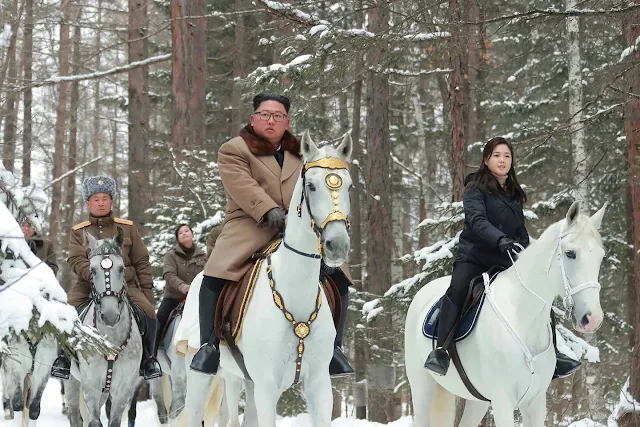Kim Jong Un tours battle sites on horseback around Mount Paektu, on the North Korea-China border, in this photo released Wednesday by Nort...
Kim Jong Un is back on his white horse, as North Korea flags a big decision to resume nuclear armament.
North Korean leader Kim Jong Un is back on his white horse, inspecting “revolutionary battle sites” in knee-high virgin snow on a sacred mountain, state media announced Wednesday, as Pyongyang foreshadowed a major policy decision later this month. The images of Kim on horseback, returning to Mount Paektu after a similar visit in October, were high on symbolism. But it was a second, more dryly worded announcement on Wednesday that was at least as significant.
The Presidium of the Political Bureau of the Central Committee of the Workers’ Party of Korea decided to convene the fifth plenary meeting of the 7th Central Committee of the Workers’ Party of Korea in the latter part of December, the Korean Central News Agency said, “to discuss and decide on crucial issues in line with the needs of the development of the Korean revolution and the changed situation at home and abroad.” Put simply, after giving the United States until the end of the year to change its approach to denuclearization talks and warning that North Korea would follow a “new path,” Kim appears to have made his decision on what that path should be, experts said.
Kim announced a halt to nuclear and intercontinental ballistic missile tests in April 2018 as North Korea and the United States pursued diplomacy. But his regime warned last month that there was no reason to stick to previous commitments, saying Pyongyang felt “betrayed” by a U.S. decision to continue with joint air drills with South Korea. Although the United States later postponed the drill, the bellicose North Korean rhetoric has continued.
Cheong Seong-Chang, a North Korea specialist at South Korea’s Sejong Institute, said the announcements taken together did not bode well for relations with Washington. “Kim Jong Un is displaying strong hostility and a strong will to resist the United States in order to gather support ahead of announcing the ‘new path,’ ” he said. “The party plenum is likely to see a strong criticism against the United States and South Korea. North Korea is highly likely to announce the discontinuation of nuclear talks and the establishment of North Korea’s status as a nuclear power.”
Ankit Panda, a North Korea expert at the Federation of American Scientists, said a Workers’ Party plenum was more significant than Kim’s much anticipated New Year’s Day speech. The last plenum took place in April, when Kim called on the United States to make a “bold decision” while threatening to put his country on a “new path.” “Presumably, we’ll now learn what happens next,” he tweeted, suggesting important new policy guidance, with the possibility that may involve a return to the byungjin policy of simultaneous military and economic development.
On Tuesday, North Korea warned that time was running out before its year-end deadline and threatened an unwelcome Christmas gift for the United States, but experts said its decision may have already been made. “The door has closed. We’re just waiting to learn exactly what has been decided,” Panda tweeted. Later Wednesday, North Korea responded angrily to President Trump’s comments from the previous day, in which he said the United States would use military force against the North if needed. Pak Jong Chon, chief of the General Staff of the Korean People’s Army, said he was disappointed by the remarks. “The Supreme Commander of our armed forces was also displeased to hear it,” he said, in a statement carried by KCNA, referring to Kim.
 |
| Kim is seen on Mount Paektu, which is revered in North Korean revolutionary mythology as the birthplace of Kim Jong Il. (Korean Central News Agency via KNS/AFP via Getty Images) |
Pak warned that all-out armed conflict could recommence between the two countries at any time, even by accident, and warned that the use of armed forces against North Korea “will be a horrible thing” for the United States. Mount Paektu is enshrined in North Korean revolutionary myth as the birthplace of Kim’s father, Kim Jong Il, and a key military base for his grandfather, Kim Il Sung, during the struggle against Japanese colonial rule. The third-generation leader’s visit to the peak read like an attempt to burnish his leadership credentials and prepare the country for a policy shift. Previous visits to the mountain have come before major decisions.
“It is of remarkable historic significance that Kim Jong Un, the great leader of our revolution who opens up the period of a great leap for the development of the revolution, personally left the sacred trace in the revolutionary battle sites in [the Mount] Paektu area, the source of the lifeline of the revolution and inexhaustible patriotism, through knee-high virgin snow,” KCNA reported.
Kim said his tour had “hardened his resolution to defend the gains of the revolution.” He said that Korean people needed to have a proper understanding of the “revolutionary traditions” of Mount Paektu and that this would help them “demonstrate the country’s dignity and honor before the world.” This spirit, he added, would enable them to overcome “the unprecedented blockade and pressure imposed by the imperialists” and help them “get prepared for the harshness and protracted character of our revolution.”










